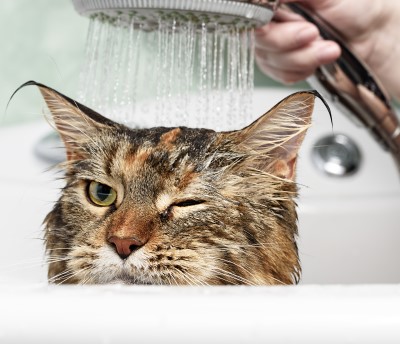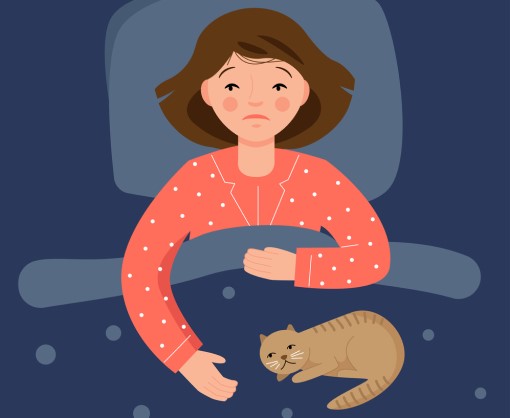
Sleeping with cat allergies: What’s at stake and 15 practical remedies
By Jason Wooden, PhD | February 13, 2022
If you’re struggling to sleep with cat allergies, you’re not the only one since 20% of pet owners are affected by allergies to cats or dogs. The most common cause is an immune reaction to a protein secreted by cats, called Fel d1, which is present in tears, saliva, hair, and urine.
For better sleep, your options include allergy meds, immunotherapy, anti-allergen sprays, air purifiers, frequent bedding washes, removing allergy traps such as carpets, and various other remedies
Here’s what’s really at stake if you’re sleeping with cat allergies
It’s no surprise how many people there are who struggle with cat allergies and getting a decent night of sleep.
After all, the domestic cat is the second most popular pet in the US and many other countries. In some countries, they’re actually more popular than dogs.
With over 370 million cats worldwide, they’re bound to be more than a few people dealing with allergies to a furry friend.
And it’s no surprise some pet owners still want to sleep with their cat even with allergies.
All the same, as much as we love our pets, there’s no escaping what a pet allergy can do to make us miserable.
Yes, there’s the sneezing, runny, and blocked noses.
And the itchy and watery eyes…
There’s also the swelling of the face and eyes, diarrhea, and vomiting.
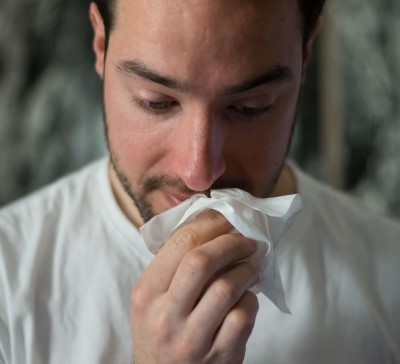
Would you believe more than 50 million people deal with various types of allergies every year in the US alone and it’s 6th leading cause of chronic illness?
What’s worse is how it can wreck our sleep.
All those symptoms can make for miserable nights – it’s harder to fall asleep and stay asleep, you’re more likely to snore, and you’re more at risk for sleep disorders such as sleep apnea.
We all need our sleep.
After a night of poor sleep, your brain doesn’t work as well as it should, you have a harder time learning, and don’t cope as well. Over the long-term, it can increase your risk for high blood pressure, heart disease, obesity, anxiety, depression, and dementia.
That’s some pretty serious stuff and bad news for cat owners, especially if you enjoy having it in the bed.
If you’re struggling to sleep with cat allergies, it’s not something to be taken lightly.
Let’s take a look at what you’re up against, the pros and cons, and what you can do about it.
What causes cat allergies?
An allergy is what happens when your immune system reacts to something that normally doesn’t bother people.
Among the things that can cause an allergy are:
- pollen
- dust
- mold
- food
- insect stings
- drugs
Unfortunately, pets can also cause allergies.
Would you believe as many 20 percent of people deal with allergies to dogs and cats?
And that as many as 30 percent of people with asthma have pet allergies?
Do you know the signs of a cat allergy?
- Sneezing or a runny or stuffy nose
- Facial pain (from nasal congestion)
- Coughing, chest tightness, shortness of breath and wheezing
- Watery, red or itchy eyes
- Skin rash or hives
Source: American College of Allergy, Asthma & Immunology
So, what’s causing all those cat allergies?
For most people, their immune system is reacting to a protein called Fel d1. It’s in the cat’s skin, tears, saliva, and urine.
It’s also on the cat’s hair.
Pets can carry other allergens in their fur such as dust mites and pollen.
As to why some people get cat allergies and others don’t, you can blame your genetics. It’s more likely to happen if allergies or conditions like asthma run in your family.
Also, lack of exposure to cats at an early age may increase your risk for an immune reaction later on when your older.
The reasons why cat allergies may get worse at night
Cat allergies, like any other allergy, can certainly get worse at night.
First, it’s pretty common that when people lay down to get even more congested. Sleeping on your back also encourages the flow of postnasal drip into the throat and can lead to more spells of coughing.
Another thing is that you may be exposed to more allergens in your bedroom. Besides your cat, there’s dust mites, pollen, mold, and chemicals.
And it’s pretty easy for pet dander to accumulate on carpet, curtains, bedding, and pajamas. That stuff sticks to everything.
Lastly, your cat is hanging out in your bed. That’s bound to ratchet up your allergen exposure during the night.
So, if you have cat allergies, it’s no surprise if they’re worse when you try to sleep.

Do cat allergies go away with exposure?
I’ve already mentioned how everyone is different when it comes to allergies. The immune response can vary widely among people and change in severity within an individual.
For reasons not well understood, allergy symptoms for some may even disappear over time. It could be that the body naturally becomes accustomed to an allergen or that there are changes in a person’s exposure to allergens in their environment.
All the same, it’s all still a bit of a mystery so you really need think about practical remedies especially if you’re dealing with severe symptoms.
Should you let your cat sleep in your bed if you have allergies?
Okay, so what are the pros and cons for people with allergies who still want to sleep with their cat?
The benefits are obvious – companionship, connection, and comfort.
Hanging out and interacting with a pet at night can be pretty relaxing before you turn the lights out. For some people, it makes them feel less lonely and less anxious which help them transition to sleep.
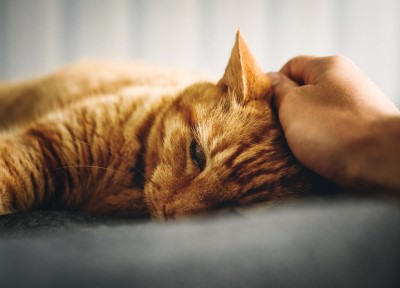
That’s all good stuff.
However, if your cat allergies are keeping you from getting sleep and you’re struggling during the day, that can be a real downer.
Ditto, if your symptoms are pretty serious and affecting your health during the day.
Your doctor may recommend you avoid cats entirely or at least keep them out of your bedroom.
15 Practical remedies worth a try to help you sleep better with cat allergies
So, you’re struggling with sleeping with cat allergies but still want to keep a cat in the house?
Perhaps, you still want the connection of having it your bedroom…
Or you’ve seriously thought about the downsides and you’re not ready to give up…
And maybe keeping your cat in the bedroom is your only option.
Regardless, you should know that the Asthma and Allergy Foundation of America recommends that you keep your pets out of the bedroom if you have allergies to them.
The challenge is that it’s so easy for pet allergens to accumulate and stick around in a room. That’s why the most effective way to deal with a cat allergy is to avoid having them in your living space.
It’s worth seeing a doctor, especially if your symptoms are seriously bad.
However, depending on your situation, there may be some things you can do so that your symptoms are more manageable:
1) Allergy medications
This one is pretty obvious. Your choices include antihistamines, decongestants, and nasal steroids. Depending on your symptoms, it may not be the best long-term solution.
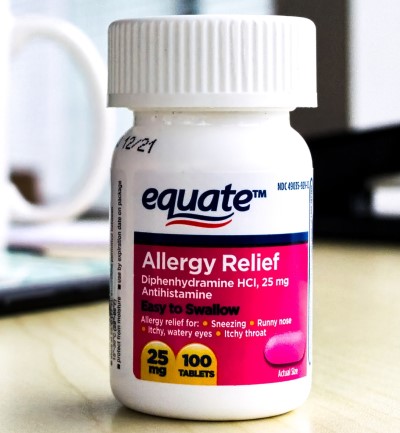
2) Allergy shots
Also known as allergy immunotherapy, a doctor can give you a specialized shots to train your immune system to react less to dog allergens.
10) Use an air purifier
Another way to cut down on allergens in your sleeping space. Try running an air purifier with a HEPA filter.
Better yet, you can add a certified allergen HVAC filter to your central heating and air conditioning system.
14) Try a less allergenic cat
This one is a bit controversial as there isn’t any clear scientific evidence that some breeds are less allergenic than others. However, living with a short-haired cat may be easier since they shed less.
Other things that can help keep your sleep on track
It should be obvious that cats allergies isn’t the only sleep challenge people face.
Unfortunately, there’s a long list of things that affect sleep.
That’s why it’s important to practice good sleep hygiene, the everyday habits that set the stage for restful sleep. Poor sleep hygiene can sabotage everything else you do for your sleep.
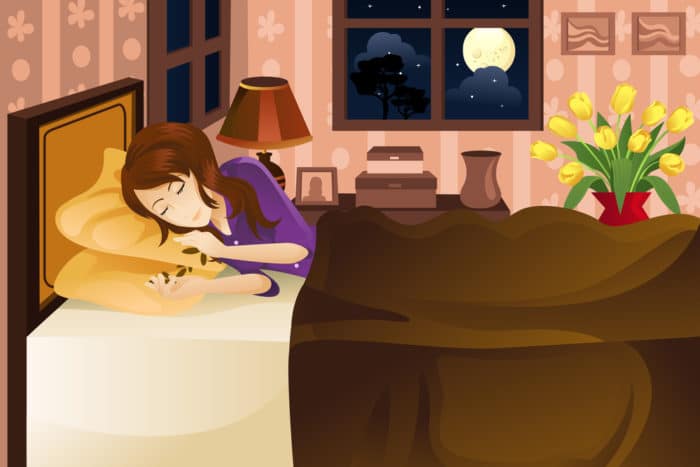
For better sleep hygiene, you should:
- keep consistent wake up & sleep times
- avoid naps
- exercise during the day
- avoid large meals, alcohol, or stimulants such as
- caffeine before bedtime
- maintain a regular bedtime routine
- avoid using TVs, laptops, or other electronics before sleep
- keep your bedroom dark, cool, quiet, & relaxing
It’s also important to see a doctor, especially if your insomnia becomes a long-term issue.
Too many people are unaware how many other medical issues can cause problems or worsen sleep.
The list includes chronic pain, heartburn, cancer, dementia, and asthma.
You could also be living with an undiagnosed sleep disorder such as sleep apnea.
You may also be interested in:
9 things to try if a cat won’t let you sleep
9 things to do if you’re using CPAP with allergies
A Practical guide to sleeping with a dog
4 things to avoid if you keep a fish tank in your bedroom
What to do if a barking dog wakes up the baby
14 things to try if you’re too lonely to sleep
16 Things to try if you’re too cold to sleep
Sleep apnea: How to get sleep while dealing with a sore throat and other symptoms
7 things to try if your phone keeps waking you up
12 Things to try if a noisy neighbor is keeping you from sleeping
12 things to try if car noise is ruining your sleep
Sources:
1. “Pet Population 2021”, Pet Food Manufacturers Association
2. “Cats vs. Dogs: Which Does the World Prefer?”, 2021, Budget Direct
3. “Number of dogs and cats kept as pets worldwide in 2018”, Statista.com
4. “Allergy Facts and Figures”, Asthma and Allergy Foundation of America
5. “Dog Allergies: Symptoms and Treatment”, 2021, American Kennel Club website
6. “Allergies and Sleep”, Sleepfoundation.org
7. “Allergies and Sleep”, Sleepfoundation.org
8. “Allergy”, MedlinePlus website
9. Dog and Cat Allergies: Current State of Diagnostic Approaches and Challenges, Allergy Asthma Immunol Res. 2018 Mar; 10(2):97–105.
10. “25 Noteworthy Allergy Statistics & Facts to Know in 2022”, 2021, MedAlertHelp.com
11. An update on molecular cat allergens: Fel d 1 and what else? Chapter 1: Fel d 1, the major cat allergen. Allergy Asthma Clin Immunol. 2018; 14:14.
12. “Cat Allergies”, 2020, Healthline
13. “Why Do My Allergies Get Worse at Night?”, MedicineNet
14. “Can You Outgrow Your Allergies?”, 2013, Live Science
15. “Pet Allergy: Are You Allergic to Dogs or Cats?”, Asthma and Allergy Foundation of America
Connect with us:
About Us
Better Sleep Simplified® was founded as a place for you to get clear and well-researched information.
Our goal is to make sure you know about your options so that you take action sooner rather than later.
Check us out on YouTube:
Watch and Learn
Helpful sleep tips, interesting sleep facts and statistics you want to know about
Affiliate Disclosure
This site is a participant in the Amazon Services LLC Associates Program and other affiliate advertising programs designed to provide a means for sites to earn advertising fees by advertising and linking to them.
Important: BetterSleepSimplified.com is for informational purposes only and is not intended or implied to be a substitute for professional medical advice, diagnosis, or treatment. Always consult a physician for sleep and health concerns. See additional information.

